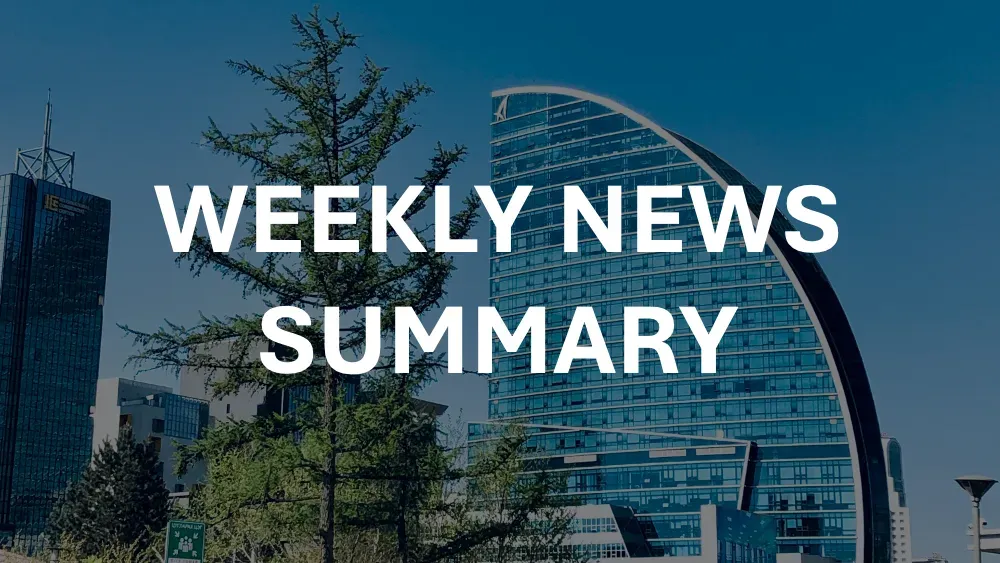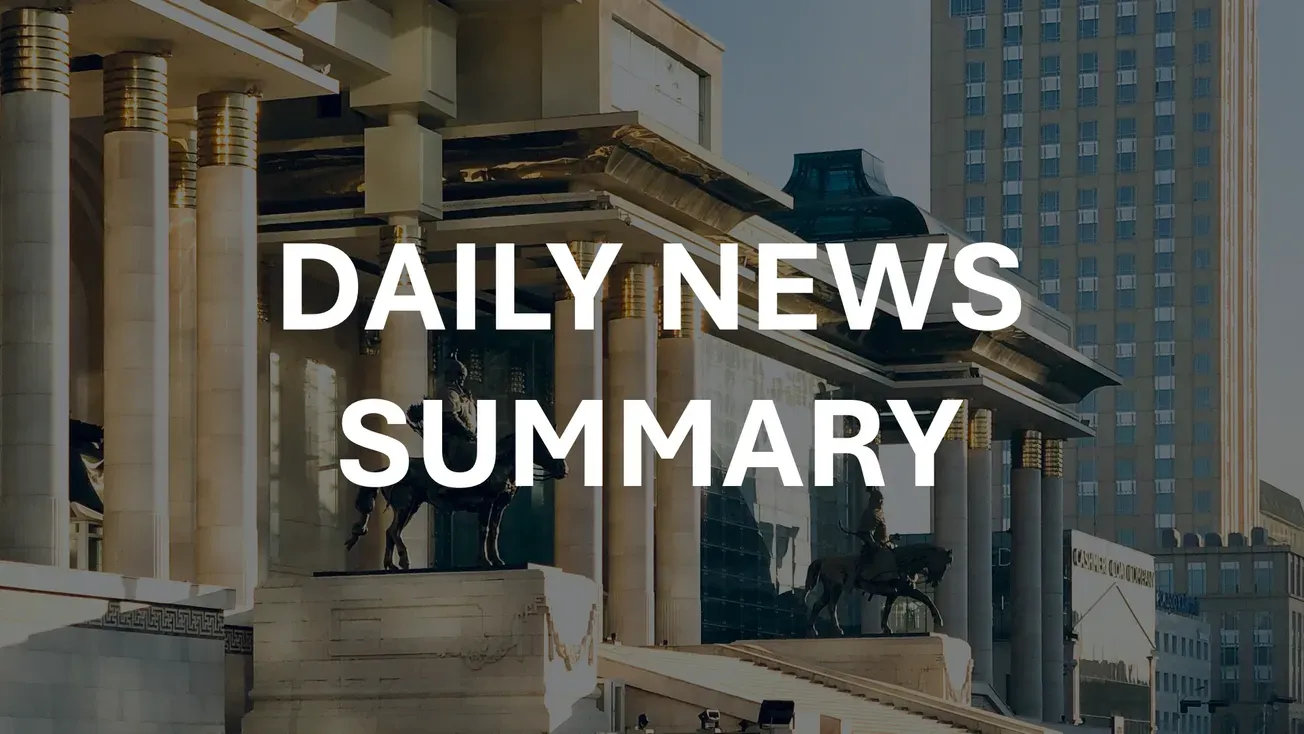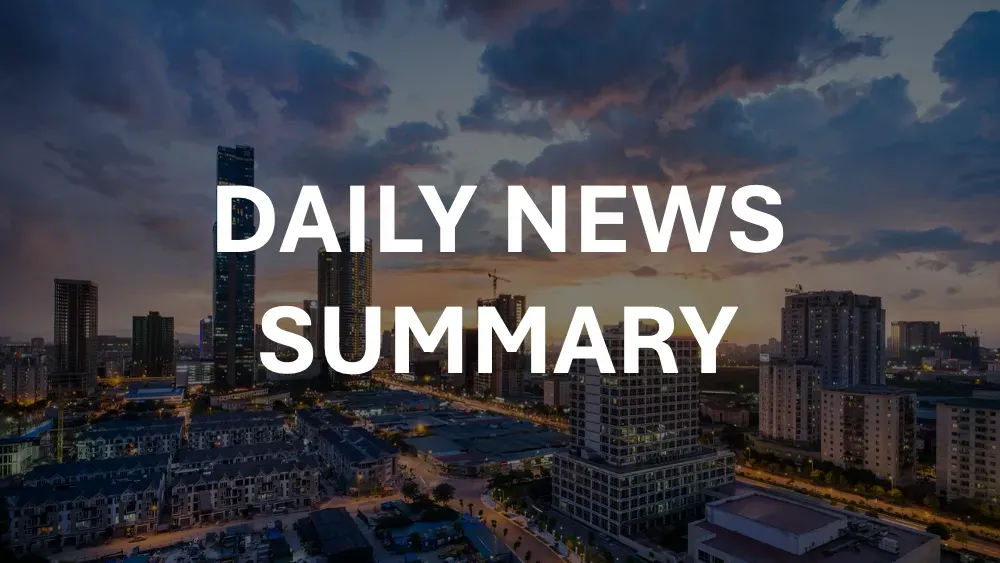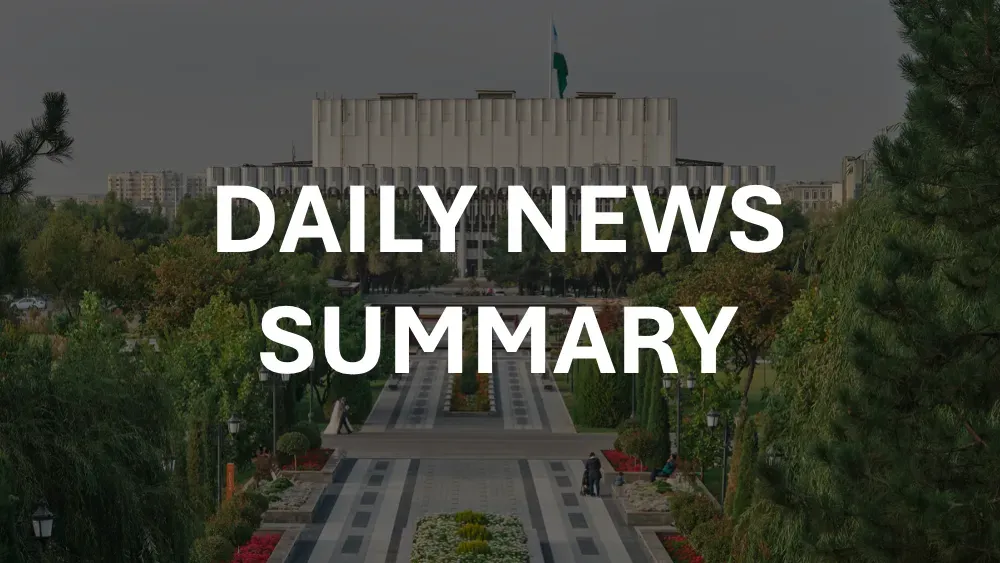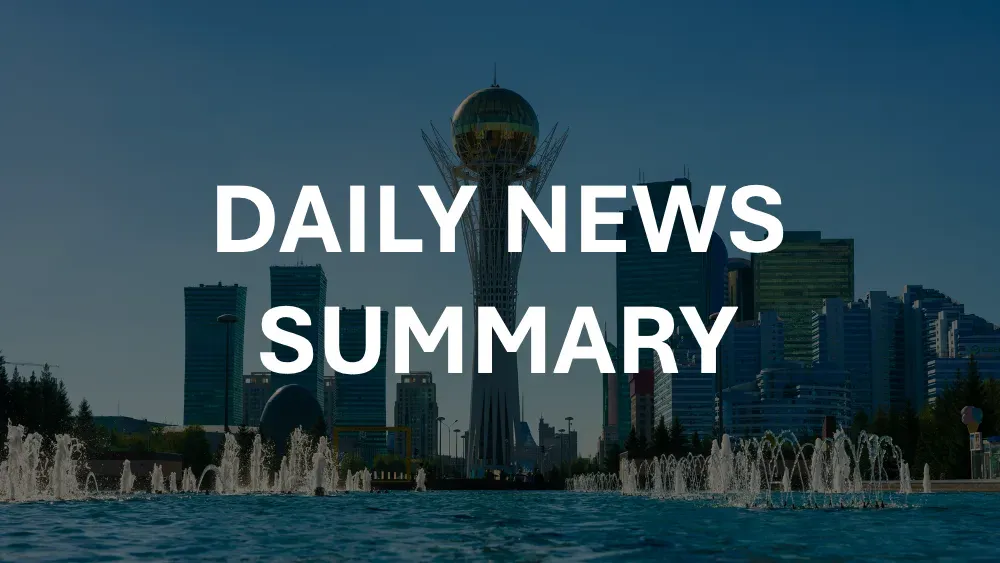This weekly digest showcases just 10 stories. Daily subscribers receive comprehensive intelligence briefs with 40 of the top stories organized by category. Don't miss the stories that matter.
Subscribe to Daily →
October 17, 2025 to October 23, 2025
This week's top 10 stories from Mongolia, selected from our daily intelligence briefs.
1. Government Targets Oyu Tolgoi Terms; Negotiations with Rio Tinto Planned as Officials Seek Larger State Share
Mongolia’s government has reopened high-stakes negotiations with Rio Tinto over the Oyu Tolgoi copper‑gold project, aiming to reduce intercompany loan interest and a 6% management fee while increasing the state’s share of project benefits. A working group led by Finance Minister B. Javkhlan and an interagency team headed by Industry and Minerals Minister G. Damdinyam will meet with a 10‑member Rio Tinto delegation October 27–31; Cabinet Secretariat Chief S. Byambatsogt and oversight chair O. Batnairamdal insist talks must follow Mongolian law and produce a more favorable split than the current 25% state / 75% company distribution. Separate teams are also tackling arbitration, Entrée/Ontre stake issues (Ontre claims a 20% benefit under a 2004 deal while Mongolia seeks talks covering 100% of the stake), and modeling debt/interest scenarios to validate state claims.
The negotiations occur amid political pressure to boost fiscal revenues — including proposals for a special mining royalty — and plans to mobilize other assets (e.g., Tavan Tolgoi’s Borteeg) to support wage and pension increases. Leadership uncertainty at Oyu Tolgoi after CEO Deirdré Lingenfelder’s departure adds risk to talks, while a U.S. federal judge has indicated readiness to approve Rio Tinto’s $138.75 million settlement over alleged Turquoise Hill disclosure failures tied to OT’s underground expansion (Rio Tinto admits no wrongdoing).
Local Coverage: ikon.mn, gogo.mn, montsame.mn, itoim.mn
From daily briefs: 2025-10-17, 2025-10-22, 2025-10-24
2. Parliament Ousts Prime Minister and Speaker on Same Day; 30-Day Clock Starts to Appoint New PM
Mongolia’s Parliament removed Prime Minister G. Zandanshatar and accepted Speaker D. Amarbayasgalan’s resignation on the same day in an unprecedented leadership shake-up that exposes deep fractures within the ruling Mongolian People’s Party (MPP). MPs voted 71–? to dismiss Zandanshatar after a contentious floor vote over procedural routes, while Amarbayasgalan’s resignation was approved 102–12 (of 114 present); Deputy Speaker Kh. Bulgantuya will act as chair until a replacement is elected. By law Parliament must nominate a new prime minister within 30 days (failure risks dissolution) and elect a new speaker as the 2026 budget deadline approaches in about 26 days, complicating governance amid escalating labor unrest—teachers launched an open-ended strike seeking a 50% pay rise and health unions renewed pay and staffing demands.
The departures follow public accusations and competing narratives: Zandanshatar defended budget measures to raise teachers’ pay 15–20%, doctors’ pay 10–15% and pensions 8% financed by spending cuts, while Amarbayasgalan framed his exit as a defense of institutional integrity against authoritarian drift. Analysts and opposition Democrats portray the moves as evidence of an MPP internal split and potential coalition maneuvering; the immediate implications are a short timeline for leadership selection, heightened political uncertainty during critical budget negotiations, and risks to continuity in managing winter preparedness and public-sector labor disputes.
Local Coverage: news.mn, urug.mn, eagle.mn, gogo.mn, unuudur.mn, ikon.mn, itoim.mn, montsame.mn
From daily briefs: 2025-10-17, 2025-10-18, 2025-10-19, 2025-10-20
3. Funding Gaps and Oversight Issues Cloud Mongolia’s Mega Project Pipeline as Power Shortfalls Persist
A recent review finds Mongolia’s energy and infrastructure pipeline stalled by funding gaps and weak oversight, leaving the country vulnerable to power shortfalls. No new power plants have been completed in recent years, Thermal Power Plant No.3 is overstretched, and the proposed Fifth Thermal Power Plant remains unfunded with an estimated price tag of $600 million. At the same time, expensive projects such as the $1.2 billion, 240 km Tavan Tolgoi–Gashuunsukhait rail line only secured a China link agreement in February 2025 after 18 years of negotiations, underscoring delays and cost exposure.
The government and Ulaanbaatar authorities are advancing 38 “mega projects” with a combined price tag of roughly MNT 93 trillion, but transparency is limited: few projects publish annual reports, only some have Environmental and Social Impact Assessments or selected developers, and several lack feasibility studies—making budgets highly speculative. Fiscal strain is evident as national budget shortfalls have prompted extra withdrawals from city revenues despite Ulaanbaatar’s revenue overperformance, while urban works (sidewalks, parks) face scrutiny over procurement, costs and imported materials, raising risks for investors and lenders.
Local Coverage: news.mn
From daily brief: 2025-10-23
4. Clock Ticking on PM Appointment as Legal Framework Guides Government Formation
Mongolia faces a constitutional deadline in its government formation: Parliament (State Great Khural) must confirm a new Prime Minister within 30 days — by November 17 — or the President may dissolve the legislature. The Constitution vests Parliament with exclusive authority over state policy, government structure and appointment/dismissal of the PM and cabinet, and requires the President, within five days of recognizing that no single party has a majority, to propose a PM nominee from the largest party or a majority-forming coalition.
Parliamentary procedure sets tight timelines: the Standing Committee on State Structure must review a nominee within three working days, followed by an open floor vote requiring a majority of members present; a rejected nominee must be replaced within five days and undergo the same process. These deadlines create pressure for rapid coalition negotiations and raise the prospect of dissolution if stalemate persists, with significant implications for political stability and investor confidence.
Local Coverage: gogo.mn
From daily brief: 2025-10-19
5. EU lenders line up €1 billion for Mongolia’s clean energy shift with broader investment push
At the EU–Mongolia Business and Investment Forum in Ulaanbaatar, which gathered about 700 government, EU and private‑sector representatives, the Mongolian government signed a memorandum of understanding with the European Investment Bank for up to €1 billion in financing targeted at clean energy and related green initiatives. The European Bank for Reconstruction and Development separately confirmed a US$1 billion package for private‑sector energy projects (previously announced at Davos), with organizers projecting a combined pipeline of roughly MNT 8 trillion over five years and priority sectors including digitalization, climate and energy, transport, health and education.
Officials framed the financing as a lever for energy self‑sufficiency and industrial development: MP T. Dorjkhand projected 10,000 green jobs and foundational investment for mining, housing and electric rail. For international investors and policymakers, the commitments signal a substantial scaling of external capital into Mongolia’s energy transition and broader economic modernization, while underscoring implementation and project‑selection risks that will determine outcomes.
Local Coverage: unuudur.mn, gogo.mn
From daily brief: 2025-10-17
6. Prime Minister G. Zandanshatar Resigns After Four Months, Marking Shortest Tenure Since 1990
Prime Minister G. Zandanshatar resigned on October 17, 2025, after taking office in June 2025, marking the shortest prime ministerial tenure in Mongolia’s post-1990 democratic era. His departure follows the June dismissal of predecessor L. Oyun-Erdene—who remains the longest-serving post-1990 prime minister—and highlights recurring executive turnover as documented in interactive timelines and datasets of Mongolia’s governments since March 21, 1990.
The instability raises immediate questions about policy continuity, cabinet stability and investor confidence heading into late 2025, with potential disruption to reform momentum and budget execution cycles. Data from ikon.mn shows the Mongolian People’s Party (MPP) has governed roughly 73% of the past 35.5 years (26 years), versus about 9 years 7 months for the Democratic Party (DP), suggesting structural advantages for the MPP in setting long-term agendas despite episodic leadership changes. Details on succession, coalition dynamics and the new cabinet will determine near-term governance priorities and political risk.
Local Coverage: gogo.mn, ikon.mn
From daily briefs: 2025-10-18, 2025-10-20
7. Inflation Reaches 9% in September as Services and Food Lead Price Gains
Consumer prices in September 2025 rose 9.0% year‑on‑year and 0.2 percentage points from August, the National Statistics Office reported, with broad-based gains led by services (+15.0% y/y) and goods (+7.0% y/y). Key drivers were food, beverages and water (adding 2.8 percentage points to the headline rate) and housing, utilities and fuel (adding 1.9 points); housing, electricity, water and fuels were up 19.4%, food and beverages up about 10.6%, and education services up 12.8%.
On public finances, preliminary January–September 2025 data show total revenue and grants of MNT 22.2 trillion, down MNT 611.3 billion year‑on‑year, while expenditure and net lending reached MNT 22.1 trillion, producing a structural deficit of MNT 1.3 trillion. Tax revenue fell to MNT 19.0 trillion—driven by declines in personal income tax (−MNT 609 billion) and mineral royalty payments (−MNT 1.3 trillion)—partly offset by higher social insurance (+MNT 645.1 billion), property tax (+MNT 120.1 billion) and VAT (+MNT 77.3 billion). The combination of elevated inflation and a weaker fiscal position underscores near‑term risks to real incomes and fiscal sustainability.
Local Coverage: news.mn, eagle.mn, ikon.mn, urug.mn
From daily briefs: 2025-10-18, 2025-10-19
8. United Airlines to Launch Mongolia Service in May 2025 as Air Liberalization Accelerates
Mongolia’s aviation market is rapidly liberalizing: MIAT CEO B. Munkhtamir reports 19 foreign and three domestic carriers now operate international routes, and United Airlines will begin service to Mongolia in May 2025, with additional Hong Kong and mainland Chinese routes expected next year. MIAT posted record 2024 operations — 4,500 flights, 1.155 million passengers and MNT 980 billion in revenue — but net margins remain thin at 2–3% because of high fuel and ground/maintenance costs.
Munkhtamir stressed the strategic need to grow year‑round demand via transit and winter‑sun routes to absorb capacity constraints on domestic‑origin flows and enable lower fares. Transit passengers rose from 3,800 in 2019 to 35,000 in 2024, with a 50,000 target for 2025 and an aspirational 100,000 goal to smooth seasonality and improve sustainability.
Local Coverage: gogo.mn
From daily brief: 2025-10-22
9. Prime Minister Defends Anti-Corruption Drive, Cites Fiscal Turnaround and Ratings Upgrade as Ouster Push Mounts
Prime Minister G. Zandanshatar used a parliamentary address to defend his four-month tenure by highlighting anti-corruption measures at state miner Erdenes Tavan Tolgoi (ETT), cuts to the civil service and fiscal consolidation. He said the government cut MNT 2.2 trillion in spending, eliminated 14,400 public posts and turned a MNT 1.3 trillion deficit into a MNT 50 billion surplus by August; foreign reserves rose to $5.9 billion and Moody’s upgraded Mongolia to B1. Zandanshatar credited tighter oversight of strategic deposits and an “extraordinary regime” at ETT with boosting coal sales and export receipts to $513.8 million over two months.
The prime minister framed an attempted ouster as driven by resistance to coal-sector probes and a stalled justice minister appointment, asserting he will not “barter the country” or make deals with “coal thieves.” For international observers and investors, the claims signal a politically charged push to reform Mongolia’s extractive sector and fiscal management, but sustained reform and stability hinge on whether the government can institutionalize oversight amid mounting political opposition.
Local Coverage: urug.mn, montsame.mn, gogo.mn
From daily brief: 2025-10-18
10. Constitutional Court Voids PM Ouster Vote, Citing Procedural Breaches and Invalid Quorum Calculation
Mongolia’s Constitutional Court (Tsets) on Oct. 22 voided Parliament’s Oct. 17 Resolution No.95 that purported to remove Prime Minister G. Zandanshatar, ruling the ouster unconstitutional and stripping the measure of legal force. The Grand Chamber identified three breaches: Parliament voted using a standing committee’s negative-formulation instead of the constitutionally required “support to dismiss” wording under Article 43.1; lawmakers improperly combined attendance across two sitting days to claim quorum; and Deputy Speaker H. Bulgantuya’s conduct violated principles of rule of law and due procedure. The Court’s decision is final with respect to the deputy speaker’s conduct and limits Parliament’s ability to simply reenact the resolution.
The ruling preserves cabinet continuity, reduces the immediate risk of a snap dissolution tied to a failed leadership change, and tightens judicial oversight of no‑confidence procedures established by the 2019 constitutional amendments. Political reactions split: cabinet officials (e.g., S. Byambatsogt) hailed the verdict, while some MPs signaled procedural pathways to re-enter the dispute via the Legal Affairs Standing Committee and plenary once the Court’s formal conclusion is transmitted. The episode underscores mounting institutional strain between the State Great Khural, the presidency, and the Constitutional Court, with implications for government formation timelines and parliamentary authority.
Local Coverage: eagle.mn, gogo.mn, montsame.mn, urug.mn, unuudur.mn, itoim.mn, ikon.mn, news.mn, medee.mn
From daily briefs: 2025-10-17, 2025-10-18, 2025-10-19, 2025-10-21, 2025-10-22, 2025-10-23, 2025-10-24
About This Weekly Digest
The stories above represent the most significant developments from Mongolia this week, selected through our AI-powered analysis of hundreds of local news articles.
Stories are drawn from our daily intelligence briefs, which synthesize reporting from Mongolia's leading news sources to provide comprehensive situational awareness for international decision-makers.
These weekly highlights are a small sample of what's happening. Daily subscribers get comprehensive briefings with 40 top stories that connect the dots between events, track developing stories, and provide the context you need for informed decision-making.
Upgrade to Daily →


